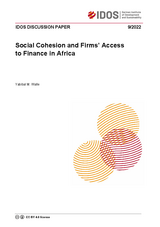Social cohesion and firms’ access to finance in Africa
Walle, Yabibal M.Discussion Paper (9/2022)
Bonn: German Institute of Development and Sustainability (IDOS)
ISBN: 978-3-96021-188-4
DOI: https://doi.org/10.23661/idp9.2022
Price: 6 €
Social cohesion has recently gained increasing attention in academic and policy circles. Apart from being a necessary feature of stable societies per se, social cohesion is also a key factor for sustainable economic development. One potential means through which social cohesion could foster economic development is by enhancing financial development. In this paper, we examine whether social cohesion is significantly associated with firms’ access to finance in Africa. To this end, we use a recently constructed dataset on social cohesion in Africa, which is based on the Afrobarometer survey and the Varieties of Democracy database. The dataset contains indices for the three pillars of social cohesion – trust, inclusive identity and cooperation for the common good. Combining this dataset with that of the World Bank Enterprise Surveys, we build a sample which covers more than 12,500 firms and 27 African countries. Our results show that all three components of social cohesion are positively associated with at least one measure of firms’ access to external finance. In particular, trust – but not inclusive identity and cooperation for the common good – is significantly associated with the likelihood that firms have a checking or savings account, or are financially constrained. When we measure access to finance with respect to having a line of credit or a loan from a financial institution, all the three pillars of social cohesion, including inclusive identity and cooperation for the common good, are related to access to finance. The results are robust to addressing endogeneity concerns using a heteroskedasticity-based identification strategy. Overall, our results suggest that improving social cohesion (e.g. through social protection, education, strengthening civil society organisations) could do more than hold society together; it could also promote access to finance, growth of firms, and thus economic development and job creation.


